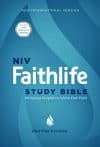I remember having my world turned upside down when I learned that there is a positive version of name-calling in the Bible. It’s everywhere. What might come to mind for you are places like Matt. 3:8 where John the Baptist greets the religious leaders coming to see him as “You brood of vipers.” How’s that for a warm welcome! But the kind that I am talking about is the kind we typically just gloss right over without noticing.
It’s the kind of name-calling my mom used to use to reshape how I thought of myself. “Will the person who left the peanut butter on the counter please come down here and put it away?” She knew who left the peanut butter out; I knew who left it out, too. But using the expression “the person who . . .” was a subtle way of changing how I thought about myself, and hopefully made me not want to be that kind of person anymore. The use of an alias like this, instead of the more expected name like “Steve,” shapes and even changes how we think about that person. I was the peanut-butter-leaver-outer.
Believe it or not, the writers of Scripture use the same technique my mom used (or maybe vice-versa) to shape how we think about people. After learning this one principle, it felt at times like I was reading the Bible again for the first time.
Sanctified name-calling in the Bible
Philippians 1:6 took on all new meaning when I thought of God as “He who began a good work in me.” Paul chose this alias expression for the same kind of reason my mom did. The One who would be faithful to complete His good work in me was the same One who started it in the first place! Thinking of God in this specific way added a whole new meaning to the verse! How could I have missed this before? Nothing had changed in the text; what had changed was me learning something new about the use of names.
Another example that blew me away is found throughout Exodus 18, where Jethro, Priest of Midian and Moses’ father-in-law, teaches Moses what is typically called the “Jethro Principle” of delegation to others. The leadership gurus tend to focus on Jethro’s credentials as a spiritual leader—priest of Midian—rather than on the basis of his personal relationship to Moses. Why does it matter? Well, Jethro is called “Moses’ father-in-law more times than he is called “Jethro,” and only once called a priest (18:1). Repeatedly connecting Jethro to Moses in this way is intended to shape how we think about him.
This name-calling fits well with other details we find in the context. Notice that Jethro comes to Moses “together with Moses’ sons and wife” Zipporah (18:5). Think about it: that would make Zipporah Jethro’s daughter. No wonder he is motivated to help Moses get his life back into balance. Moses has been back from Egypt for a number of months, returning to the very same place he had been shepherding Jethro’s flocks before the LORD appeared to him (Exo. 3:1). This means Moses had been in Jethro’s back 40 acres for a while, yet had not sent for his family to return to him. So while Jethro might be a priest, the name-calling directs us to read Exodus 18 as a story about a father-in-law helping his son-in-law get life back into balance so that his daughter and grandsons could get back together with their dad.
While nothing will be added to or taken away from Scripture, learning new principles can offer insights that make it seem as though we are reading the text (again) for the first time. The only thing that has changed is the insight with which we are reading, enabling us to see and understand what has always been there. So next time you are reading, be sure to keep track of the names used, and be sure to pay attention to the places where it has changed. You never know what kind of insights you might gain by recognizing how the writers are shaping our thinking.
***

Stay curious. There’s more to explore. Pick up the NIV Faithlife Study Bible today!





